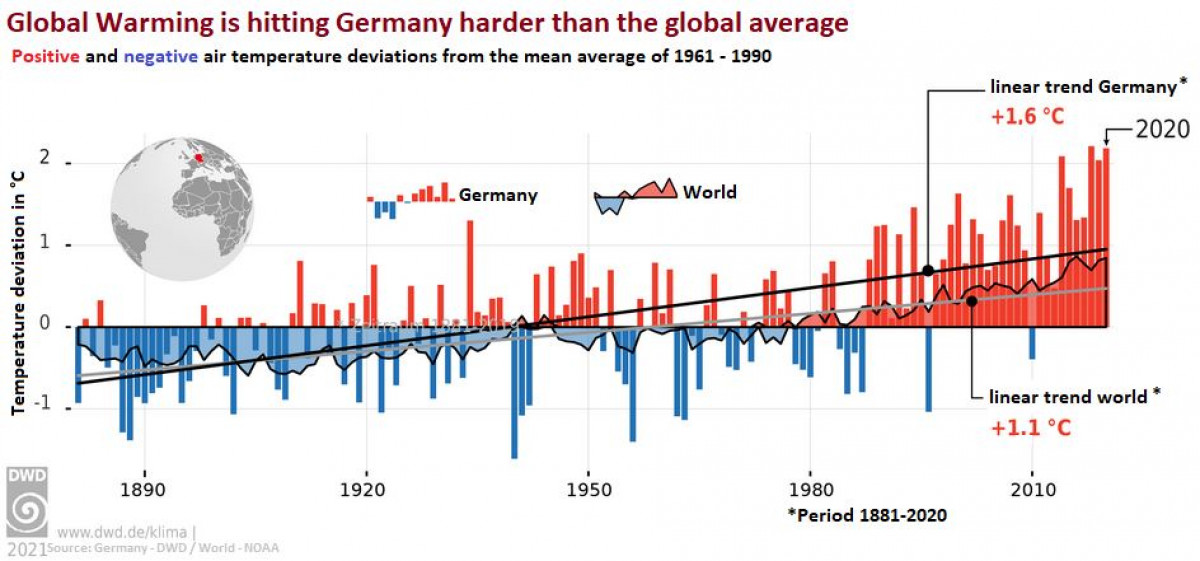
The UN Framework Convention on Climate Change has released the latest scientific document from the Intergovernmental Panel on Climate Change. This report shows that climate change caused by humans is already having an impact on the planet's ecosystems. This report is the latest scientific evidence to show that the world is getting closer to climate-driven "tipping point" and that it is urgent for effective and rapid action to protect the Earth's inhabitants and ecosystems.
The report found that Earth's temperature rose by 1.2 degree Celsius more than it was before industrialization. The sea level rose another 0.5 meters and atmospheric concentrations of greenhouse gasses continued to rise. The carbon dioxide levels have reached a new high, and the levels of nitrous oxide (and methane) also have increased. These changes can be attributed to an increased combustion of fossil fuels.

Climate change's impacts are growing more severe as the world faces a worsening energy crisis. This climate emergency, which puts both humans and ecosystems in danger, is being caused by an increase of the severity of weather phenomena. Many species and plants are currently experiencing mass mortalities. Furthermore, many weather extremes are simultaneously causing cascading impacts that make managing the climate change effects even more difficult.
Nations took steps to address the climate crisis during the year. The Inflation Reduction Act was passed by the United States. It injects $369 million into the economy, and supports clean energy and clean infrastructure. Australia and Canada, which both signed onto the UNFCCC, increased their targets for reducing emissions and addressing ocean issues. There was a lot of pressure for progress in the climate crisis area by 2022.
The ocean was still the focus of attention throughout the year. Governments, civil society and companies made commitments to address it. The EU adopted an adaptation strategy in February, which will boost the evidence base of adaptation solutions and accelerate the rollout of these strategies. Some of these actions have already been put into action in the form of new funding arrangements. These will allow for more resources for developing nations. Despite this progress, there's still much to do in 2022.
Another significant milestone was the adoption of the UN's AIM for Climate initiative, a multi-national partnership led by the United States and the UN Foundation. This major summit is planned for May in Washington D.C. It will also be used to help set a sector-wide price for carbon emissions and catalyze other ocean action commitments.

The 2022 IPCC report outlines what the world is facing in the face of the climate crisis. Global warming is threatening the health of many people, especially in Africa. Additionally, the report points out that sea level is rising and that ocean acidsification is making it harder for the oceans and land ecosystems in the world to function as sinks. Unless a rapid decline in greenhouse gas emissions is made, these trends will continue.
The report also highlights the fact that global temperatures are unlikely to stabilize for 20-30 years. This is a long process that will have important implications both for present and future generations.
FAQ
How does climate politics affect global efforts for its resolution?
Climate change is highly politicized and has caused division between governments, individuals, and nations. Politics of different actors can have an impact on the implementation of climate change measures. It has become difficult to find consensus on global efforts to tackle this pressing environmental crisis.
Scientific consensus is unanimous that human-caused climate change is real and needs to be addressed. These politics often hamper global cooperation needed to achieve effective progress in implementing sustainable energy practices.
Most governments are eager to protect their business interests and enforce rules that will limit business activity as much as possible. This is often in conflict with the regulations experts recommend to combat climate change. Without strong commitments from all participating countries and wide-scale international action, it becomes very difficult for any single state or group of states to adequately address climate change through legislation or otherwise.
Different power dynamics can make it difficult to achieve full consensus on the best ways to address climate change. Countries with more economic power may appoint themselves to be represented on international bodies for negotiations about the environment. This can lead the to divisive discussions between the countries' interests and the collective interest. In addition, potential side effects from implementing radical changes such as geoengineering have been debated heavily at both national and international levels.
A grassroots movement has also struggled against powerful opposition, including corporate ownerships as well-funded lobbyists trying to keep their industries politically favorable. This is especially true when it comes funding research into alternative energy production and enforcing mandates for renewable energy technology. Individual governments need to be clear about the potential rewards and outcomes of making valid progress on the issue. They cannot seek short-term spectacles or gains to gain public support.
To mitigate the current environmental crisis, it will be crucial that resources are properly distributed and political divisions between countries are not overlooked.
What is the role that individuals and groups can play in addressing climate-change?
Climate change is one our greatest contemporary challenges. It affects all of us and requires our collective attention as well as individual actions to make a real difference.
Individuals have a crucial role in helping to address climate change and reduce its effects. Everyday behaviors can include anything from reducing waste and consuming consciously, going through changes in lifestyle such as switching to a vegetarian diet, consuming less meat, using public transportation more often, and choosing more sustainable materials in clothing and home decor. They can also be involved in political advocacy, and encourage initiatives within their communities that foster sustainability.
Community involvement is key in addressing climate changes on a larger scale. They can adopt policies that reduce emissions. These include reformulating energy models that are based on renewable sources, encouraging efficient infrastructure for bicycle or electric transport, reducing deforestation and encouraging composting systems for waste disposal. Collaboration across different communities and countries is essential for this mission's success.
This will help individuals become aware of the issues at stake and understand how to contribute positively to tackling them. This will help individuals become aware of the issues at stake and understand our interconnectedness with other societies further away from our geographical location but similarly affected by global warming
Ultimately employers have a major responsibility when it comes to fighting climate change: introducing corporate practices focused on sustainability and opting for green alternatives whenever possible will undoubtedly yield positive results both economically and sociologically speaking.
Therefore individuals' actions plus community-wide policies together with business transformation will contribute immensely towards creating solutions against global warming and collectively defending humanity against longer terms harmful effects growing out from climate change.
How can the energy sector be involved in climate change?
It is crucial that the energy sector plays a significant role in climate change. Global warming is caused by the release of carbon dioxide into the atmosphere. This traps heat and causes an increase in Earth's average temperature.
Energy sources must shift away from fossil-emitting energy sources like coal and natural gases and towards renewable energy sources like wind, solar and geothermal to address this problem. This change can be made by government policy, incentives, and investments in innovative technology, such as hydrogen fuel cells. Businesses and households can both reduce their carbon footprints while also lowering their electricity bills by investing into infrastructure that supports this use of renewable resources.
Other ways include switching from polluting transportation options such as petrol-fueled cars to moving towards electric or public transport. Governments have great power to lead societies' transitions away from oil-based infrastructures by supporting research into battery technologies and incentivizing consumers to invest in cleaner modes of transportation.
In order to reduce their carbon footprint, companies need to adopt green business methods. These include installing better insulation systems in offices and creating energy efficiency plans for manufacturing facilities. This will help reduce operational costs and improve environmental performance.
These initiatives should be championed at all levels, not just at company level but also at government. Raising taxes on pollution products encourages individuals and businesses to stop using harmful practices. While this may be a financial outlay for polluters, providing vouchers for or subsidy for low-carbon products can create a continuing market to support sustainability efforts. It is important to recognize that tackling climate change takes a lot of effort from both the private and public sectors.
What is the potential impact of land-use change and deforestation upon climate change?
The climate is directly affected when land use and deforestation are both occurring. The trees that have been cut down or burned can no longer absorb carbon dioxide, one of Earth's most important greenhouse gases. Carbon dioxide is therefore less removed from the atmosphere when trees are deforested or burned for agricultural purposes.
At the same time, changes in land use can also release more greenhouse gases into the atmosphere. For example, when forests are replaced with agricultural lands for livestock production, fertilizer, and pesticide use may increase emissions of nitrous oxide and methane. Clearance can increase exposure of soils that have large amounts stored carbon. These soils release carbon dioxide when they are turned over or disturbed through farming activities.
Deforestation and land-use changes can have a significant impact on regional air quality. For instance, smoke from burning events associated with deforestation has been linked to decreased visibility as well as health concerns such as asthma and other respiratory ailments. These changes in local air quality can have a cumulative effect on global climate change through higher temperatures resulting from more sun reaching the surface of the planet due to reduced aerosol particles in the atmosphere which usually scatter some sunlight away from the Earth's surface.
Deforestation and changes in land use have contributed significantly to the increase in global greenhouse gas emissions. They also have had adverse effects on local air quality, which further contributes to climate change. Reducing these practices should be a high priority if serious efforts toward mitigating climate change are to take place promptly.
What can we do to limit or mitigate the impacts of climate change?
There are many ways to reduce or mitigate the impact of climate change. There are many ways to reduce greenhouse gas emissions. These include using more sustainable energy and alternative sources of power. Protecting forests and wilderness habitats. Investing in sustainable transport systems. Strengthening early warning systems for natural disasters. Creating a research program about the impacts of climate change on biodiversity. Investing in green technologies like solar panels and wind turbines. Developing sustainable consumption habits and implementing appropriate environmental regulations in all areas of society. It's important that people are educated about climate change. This encourages them to take responsibility for their actions.
Statistics
- features Earth's average surface temperature in 2022 tied with 2015 as the fifth warmest on record, according to an analysis by NASA. (climate.nasa.gov)
- Indigenous peoples and local communities receive less than 1% of all climate funding despite scoring wins for people and nature Africa's broken food markets must be fixed to tackle hunger (climatechangenews.com)
- According to the 2014 report on Climate Change Impacts, Adaptation, and Vulnerability (page 8) from the United Nations Intergovernmental Panel on Climate Change, governments at various levels are also getting better at adaptation. (climate.nasa.gov)
- The 100 least-emitting countries generate 3 per cent of total emissions. (un.org)
- Fossil fuel production must decline by roughly 6 percent per year between 2020 and 2030. (un.org)
External Links
How To
How to Incorporate Sustainable Practices into Your Daily Life to Fight Climate Change
Reducing your consumption of energy and food is one way you can integrate sustainable practices into your day. Try shopping secondhand, borrowing from family and friends, or buying new items every other day. Eating vegetarian meals at least once a week can reduce methane emissions from livestock production. To conserve energy, it is a good idea to turn off all lights when you leave a room.
A second way to combat climate change is to reduce emissions from transport sources such as cars and planes by carpooling or using public transit instead. Solar panels can also be used as a renewable power source to produce electricity at home, replacing traditional fossil fuels. In order to take effective action against climate change, it is vital that policy makers support clean air regulations. Engaging with others on issues such as plastic pollution and deforestation can be hugely beneficial, since it makes citizens more aware of the issue and encourages them to act.